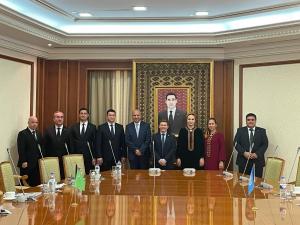Turkmenistan has made significant progress in increasing the share of the non-state sector in its GDP (excluding fuel and energy), which reached 71.1% in 2022. Public-Private Partnerships (PPPs) are considered by Turkmenistan as an important tool to further advance the implementation of the SDGs and to increase private sector GDP share and participation in the economy.
The strategic importance of developing PPPs was stressed by Mr. Serdar Jorayew, Minister of Finance and Economy of Turkmenistan, when presenting the second Voluntary National Review of Turkmenistan at the High-Level Political Forum on Sustainable Development in New York earlier this year.
Improving the PPP legal and institutional framework
The first concrete step taken by Turkmenistan to attract PPP investment was the enaction in 2021 of a new PPP Law. In addition, secondary legislation is being prepared to complete the PPP legal framework.
A key component of countries’ efforts to harness PPPs for mobilizing financing is the establishment of appropriate/relevant public sector structures, specifically aimed at better attracting private sector finance into PPPs and the delivery of key public services. Typically, this involves the establishment of a PPP Unit within the Ministry of Finance and Economy. PPP units play a crucial role in building PPP capacity and implementing PPP policy, programmes and projects in the public sector.
Using the UNECE PPP approach in support of the SDGs to deliver bankable projects
Supporting Turkmenistan to implement the SDGs through PPPs and improve its legal and institutional framework were the main objectives of a training seminar organized by UNECE jointly with the United Nations Resident Coordinator’s office in Turkmenistan and the Ministry of Finance and Economy of Turkmenistan. Experience from various countries in PPP sectors, such as renewable energy, transportation, waste and water management, education and healthcare, was presented at the seminar, with a particular focus on smart and digital transformations. The sharing of experiences by other countries in the region also showed that dedicated PPP units play a crucial role as a one-stop shop for PPP investors.
UNECE typically offers support to its member States to set up PPP units and provide specialized training to their staff. This support is in line with UNECE’s broader “PPPs for the SDGs approach” and the related tools, standards and guidelines, including the UNECE PPP and Infrastructure Evaluation and Rating System (PIERS). UNECE continues to support its member States to ensure that their projects are bankable and contribute to the three sustainability pillars: economic, social and environmental.
The seminar in Ashgabat was attended by representatives from the Ministry of Finance and Economy, the Transport Agency, Arkadag City authorities, and the Union of Industrials and Entrepreneurs.
The relevance and impact of the UNECE PPP approach to PPPs in Turkmenistan and in other countries in the region will be reviewed at the forthcoming session of the Working Party on PPPs on 30 November and 1 December 2023.


